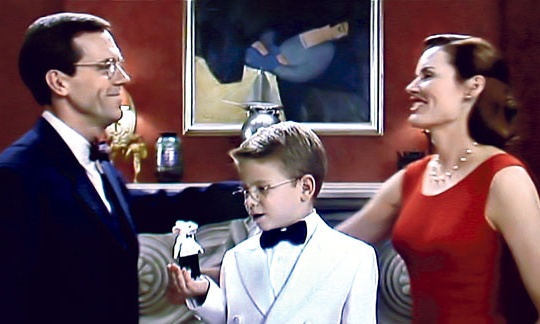Home
Flashbacks in a Maze of Familiar Places
- Details
- Written by: Rod Boyle
- Category: Dreams
- Hits: 2194
I'm with the boy, upstairs in a giant space, house perhaps, a party. There's a painting on a wall and as I walk forward to it it animates and changes itself, like one of those postcards that flip between images when you tip them, only this painting is changing into many different things at once, every step forward bursts of colors grow and change...
I'm trying to show the boy, only he isn't seeing it, but he's very understanding, and when I take the final step towards the painting it breaks up, is no longer a painting, is instead a vase, a plant, a lamp...
"Flashbacks" I realize, and I'm intrigued, I'd heard, read, that they were a myth, but there's some novelty to this and I intend to enjoy them...
We're wandering through the top of the house, he meets some familiar acquaintance whom I recognize but don't know, his wife, I introduce the son and the man tells me "I know", the boy explains that he had dated his mother when he was young...
We're looking for a pub, walking over catwalks, looking into familiar old schoolyards, memories of forgotten dreams now remembered again and pasted together like a collage of imaginary landscapes, everywhere is familiar, but the arrangement is not, somewhere there's a pub...
I find a bathroom, looking at the toilet seat it's covered in holographic decals, I call in the boy to show him, they're not flashbacks, he merely appears, looks, gently pulls a couple of pieces of toilet paper and covers them up, he's gently patronizing me, not getting it and I still must be having flashbacks...
Sleeping Lady with Black Vase found in Stuart Little
- Details
- Written by: Rod Boyle
- Category: Found
- Hits: 2379

An astute art historian suffering through Stuart Little discovers a lost Hungarian art masterpiece being used as a prop in the background of Stuart Little.
Read the full story here: http://www.theguardian.com/world/2014/nov/27/stuart-little-art-historian-long-lost-hungarian-masterpiece
David Foster Wallace - This is Water
- Details
- Written by: Rod Boyle
- Category: Audio & Podcasts
- Hits: 1878
{embed:youtube:8CrOL-ydFMI}
on Money
- Details
- Written by: Rod Boyle
- Category: Link of the day
- Hits: 2214
An interesting article on how money buys happiness, or doesn't as the case may be. It's a review for the book 'Billionaires', I can offer no review of the book, but the review itself is excellent.
Quotes:
Maybe my favorite study done by the Berkeley team rigged a game with cash prizes in favor of one of the players, and then showed how that person, as he grows richer, becomes more likely to cheat. In his forthcoming book on power, Keltner contemplates his findings:
"If I have $100,000 in my bank account, winning $50 alters my personal wealth in trivial fashion. It just isn’t that big of a deal. If I have $84 in my bank account, winning $50 not only changes my personal wealth significantly, it matters in terms of the quality of my life—the extra $50 changes what bill I might be able to pay, what I might put in my refrigerator at the end of the month, the kind of date I would go out on, or whether or not I could buy a beer for a friend. The value of winning $50 is greater for the poor, and, by implication, the incentive for lying in our study greater. Yet it was our wealthy participants who were far more likely to lie for the chance of winning fifty bucks."
There is plenty more like this to be found, if you look for it. A team of researchers at the New York State Psychiatric Institute surveyed 43,000 Americans and found that, by some wide margin, the rich were more likely to shoplift than the poor. Another study, by a coalition of nonprofits called the Independent Sector, revealed that people with incomes below twenty-five grand give away, on average, 4.2 percent of their income, while those earning more than 150 grand a year give away only 2.7 percent. A UCLA neuroscientist named Keely Muscatell has published an interesting paper showing that wealth quiets the nerves in the brain associated with empathy: if you show rich people and poor people pictures of kids with cancer, the poor people’s brains exhibit a great deal more activity than the rich people’s.
&&
“As you move up the class ladder,” says Keltner, “you are more likely to violate the rules of the road, to lie, to cheat, to take candy from kids, to shoplift, and to be tightfisted in giving to others."
Link: http://www.newrepublic.com/article/120092/billionaires-book-review-money-cant-buy-happiness
Page 621 of 877





















